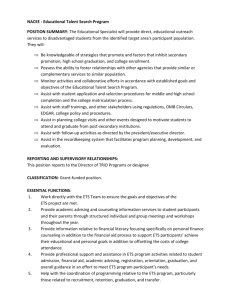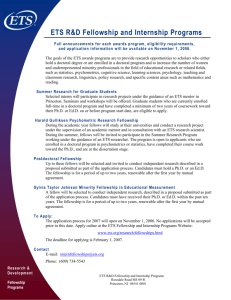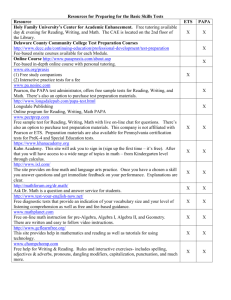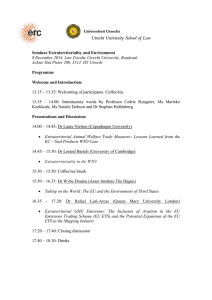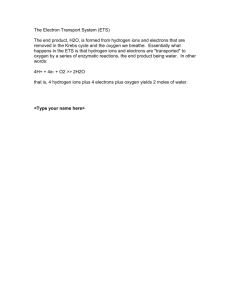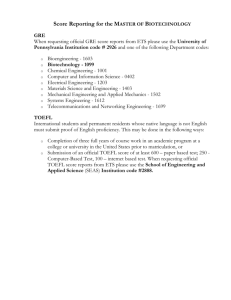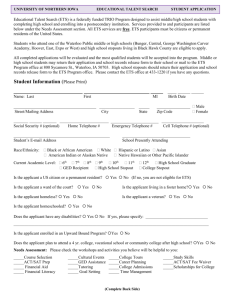Teacher Preparation Program Report
advertisement
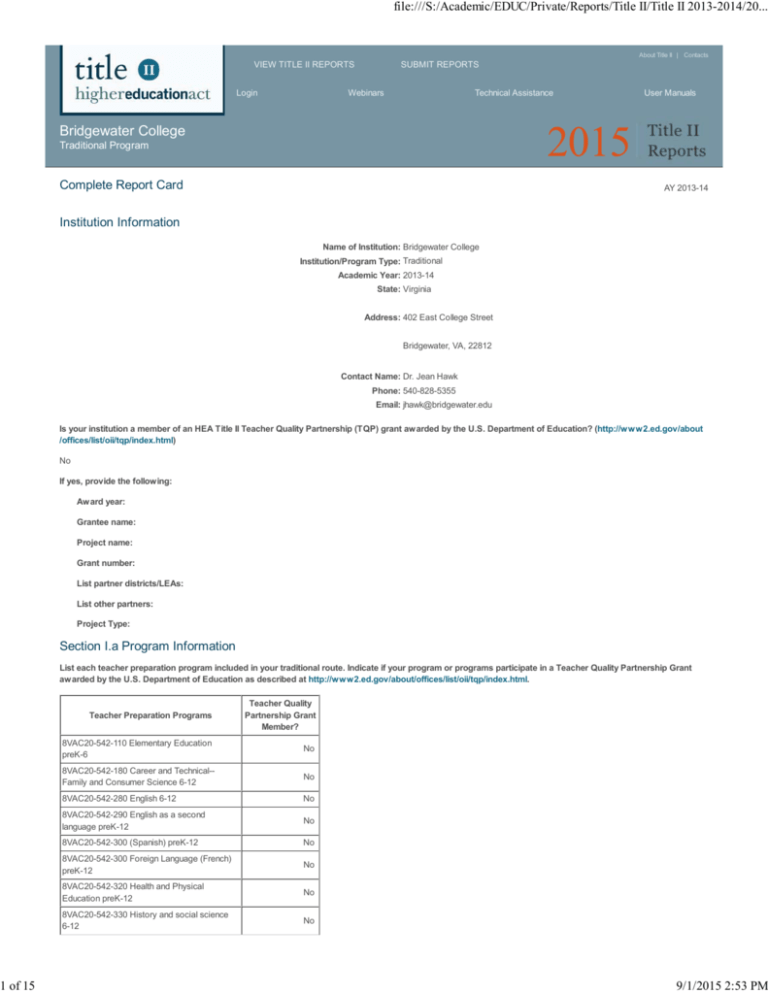
1 of 15 file:///S:/Academic/EDUC/Private/Reports/Title II/Title II 2013-2014/20... About Title II | Contacts VIEW TITLE II REPORTS Login SUBMIT REPORTS Webinars Technical Assistance User Manuals Bridgewater College Traditional Program Complete Report Card AY 2013-14 Institution Information Name of Institution: Bridgewater College Institution/Program Type: Traditional Academic Year: 2013-14 State: Virginia Address: 402 East College Street Bridgewater, VA, 22812 Contact Name: Dr. Jean Hawk Phone: 540-828-5355 Email: jhawk@bridgewater.edu Is your institution a member of an HEA Title II Teacher Quality Partnership (TQP) grant awarded by the U.S. Department of Education? (http://www2.ed.gov/about /offices/list/oii/tqp/index.html) No If yes, provide the following: Award year: Grantee name: Project name: Grant number: List partner districts/LEAs: List other partners: Project Type: Section I.a Program Information List each teacher preparation program included in your traditional route. Indicate if your program or programs participate in a Teacher Quality Partnership Grant awarded by the U.S. Department of Education as described at http://www2.ed.gov/about/offices/list/oii/tqp/index.html. Teacher Preparation Programs Teacher Quality Partnership Grant Member? 8VAC20-542-110 Elementary Education preK-6 No 8VAC20-542-180 Career and Technical-Family and Consumer Science 6-12 No 8VAC20-542-280 English 6-12 No 8VAC20-542-290 English as a second language preK-12 No 8VAC20-542-300 (Spanish) preK-12 No 8VAC20-542-300 Foreign Language (French) preK-12 No 8VAC20-542-320 Health and Physical Education preK-12 No 8VAC20-542-330 History and social science 6-12 No 9/1/2015 2:53 PM 2 of 15 file:///S:/Academic/EDUC/Private/Reports/Title II/Title II 2013-2014/20... 8VAC20-542-370 Mathematics 6-12 No 8VAC20-542-390 Music (Instrumental) preK-12 No 8VAC20-542-400 Music (Vocal/Choral) preK-12 No 8VAC20-542-410 Science-Biology 6-12 No 8VAC20-542-420 Science (Chemistry) 6-12 No 8VAC20-542-440 Science (Physics) 6-12 No 8VAC20-542-510 Theater Arts preK-12 No 8VAC20-542-520 Visual Arts perK-12 No Total number of teacher preparation programs: 16 Section I.b Admissions Indicate when students are formally admitted into your initial teacher certification program: Other Once they've established a Bridgewater College GPA of 2.5 and met all other admissions requirements Does your initial teacher certification program conditionally admit students? Yes Provide a link to your website where additional information about admissions requirements can be found: https://www.bridgewater.edu/academics/departments/education/tep-transition-points Please provide any additional comments about or exceptions to the admissions information provided above: The state has a SAT and/or ACT score waiver option for the Praxis Core Mathematics assessment, which the Bridgewater College Teacher Education Program also accepts for admissions. Section I.b Undergraduate Requirements Please provide the following information about your teacher preparation program's entry and exit requirements. (§205(a)(1)(C)(i)) Are there initial teacher certification programs at the undergraduate level? Yes If yes, for each element listed below, indicate if it is required for admission into or exit from any of your teacher preparation program(s) at the Undergraduate level. Element Required for Entry Required for Exit Transcript Yes Yes Fingerprint check No Yes Background check No Yes Minimum number of courses/credits/semester hours completed No Yes Minimum GPA Yes Yes Minimum GPA in content area coursework No Yes Minimum GPA in professional education coursework No Yes Minimum ACT score No No Minimum SAT score No No Minimum basic skills test score Yes Yes Subject area/academic content test or other subject matter verification No Yes Recommendation(s) Yes Yes Essay or personal statement Yes No Interview Yes No Other Program Exit Survey No Yes What is the minimum GPA required for admission into the program? 2.5 What was the median GPA of individuals accepted into the program in academic year 2013-14 3.08 What is the minimum GPA required for completing the program? 2.5 What was the median GPA of individuals completing the program in academic year 2013-14 3.36 Please provide any additional comments about the information provided above: 9/1/2015 2:53 PM 3 of 15 file:///S:/Academic/EDUC/Private/Reports/Title II/Title II 2013-2014/20... Section I.b Postgraduate Requirements Please provide the following information about your teacher preparation program's entry and exit requirements. (§205(a)(1)(C)(i)) Are there initial teacher certification programs at the postgraduate level? No If yes, for each element listed below, indicate if it is required for admission into or exit from any of your teacher preparation program(s) at the Postgraduate level. Element Required for Entry Required for Exit Transcript Data not reported Data not reported Fingerprint check Data not reported Data not reported Background check Data not reported Data not reported Minimum number of courses/credits/semester hours completed Data not reported Data not reported Minimum GPA Data not reported Data not reported Minimum GPA in content area coursework Data not reported Data not reported Minimum GPA in professional education coursework Data not reported Data not reported Minimum ACT score Data not reported Data not reported Minimum SAT score Data not reported Data not reported Minimum basic skills test score Data not reported Data not reported Subject area/academic content test or other subject matter verification Data not reported Data not reported Recommendation(s) Data not reported Data not reported Essay or personal statement Data not reported Data not reported Interview Data not reported Data not reported Other Data not reported Data not reported What is the minimum GPA required for admission into the program? What was the median GPA of individuals accepted into the program in academic year 2013-14 What is the minimum GPA required for completing the program? What was the median GPA of individuals completing the program in academic year 2013-14 Please provide any additional comments about the information provided above: Section I.c Enrollment Provide the number of students in the teacher preparation program in the following categories. Note that you must report on the number of students by ethnicity and race separately. Individuals who are non-Hispanic/Latino will be reported in one of the race categories. Also note that individuals can belong to one or more racial groups, so the sum of the members of each racial category may not necessarily add up to the total number of students enrolled. For the purpose of Title II reporting, an enrolled student is defined as a student who has been admitted to a teacher preparation program, but who has not completed the program during the academic year being reported. An individual who completed the program during the academic year being reported is counted as a program completer and not an enrolled student. Additional guidance on reporting race and ethnicity data. Total number of students enrolled in 2013-14: 124 Unduplicated number of males enrolled in 2013-14: 29 Unduplicated number of females enrolled in 2013-14: 95 2013-14 Number enrolled Ethnicity Hispanic/Latino of any race: 2 Race American Indian or Alaska Native: 1 Asian: 1 Black or African American: 6 Native Hawaiian or Other Pacific Islander: 0 White: Two or more races: 116 0 Section I.d Supervised Clinical Experience Provide the following information about supervised clinical experience in 2013-14. Average number of clock hours of supervised clinical experience required prior to student teaching 150 9/1/2015 2:53 PM 4 of 15 file:///S:/Academic/EDUC/Private/Reports/Title II/Title II 2013-2014/20... Average number of clock hours required for student teaching 530 Average number of clock hours required for mentoring/induction support 0 Number of full-time equivalent faculty supervising clinical experience during this academic year 12 Number of adjunct faculty supervising clinical experience during this academic year (IHE and PreK-12 staff) 6 Number of students in supervised clinical experience during this academic year 177 Please provide any additional information about or descriptions of the supervised clinical experiences: Over the course of the program, candidates take part in five field experiences, which are each taken concurrently with a specified class. The sixth and final clinical experience is student teaching – a full-day, 15-week, supervised placement. All supervisors were counted once above, although some oversaw students in both the fall and spring semesters. In early field experiences, the faculty member teaching the concurrent course supervises the students in the field experience. The EDUC 380 Practicum has a 1:12 faculty to candidate ratio. The Student Teaching sections (EDUC 460, 465 and 470) have a 1:1 supervisor to candidate ratio. Each faculty member receives a 1 credit hour load per student teacher that s/he supervises. Section I.e Teachers Prepared by Subject Area Please provide the number of teachers prepared by subject area for academic year 2013-14. For the purposes of this section, number prepared means the number of program completers. "Subject area" refers to the subject area(s) an individual has been prepared to teach. An individual can be counted in more than one subject area. If no individuals were prepared in a particular subject area, please leave that cell blank. (§205(b)(1)(H)) Subject Area Number Prepared Education - General Teacher Education - Special Education Teacher Education - Early Childhood Education Teacher Education - Elementary Education 26 Teacher Education - Junior High/Intermediate/Middle School Education Teacher Education - Secondary Education 10 Teacher Education - Multiple Levels 15 Teacher Education - Agriculture Teacher Education - Art 1 Teacher Education - Business Teacher Education - English/Language Arts 2 Teacher Education - Foreign Language Teacher Education - Health 12 Teacher Education - Family and Consumer Sciences/Home Economics 9 Teacher Education - Technology Teacher Education/Industrial Arts Teacher Education - Mathematics 3 Teacher Education - Music 2 Teacher Education - Physical Education and Coaching Teacher Education - Reading Teacher Education - Science Teacher Education/General Science Teacher Education - Social Science Teacher Education - Social Studies 2 Teacher Education - Technical Education Teacher Education - Computer Science Teacher Education - Biology 1 Teacher Education - Chemistry Teacher Education - Drama and Dance Teacher Education - French Teacher Education - German Teacher Education- History 2 Teacher Education - Physics 1 Teacher Education - Spanish Teacher Education - Speech Teacher Education - Geography Teacher Education - Latin Teacher Education - Psychology Teacher Education - Earth Science Teacher Education - English as a Second Language 5 Teacher Education - Bilingual, Multilingual, and Multicultural Education 9/1/2015 2:53 PM 5 of 15 file:///S:/Academic/EDUC/Private/Reports/Title II/Title II 2013-2014/20... Education - Other Specify: Section I.e Teachers Prepared by Academic Major Please provide the number of teachers prepared by academic major for academic year 2013-14. For the purposes of this section, number prepared means the number of program completers. "Academic major" refers to the actual major(s) declared by the program completer. An individual can be counted in more than one academic major. If no individuals were prepared in a particular academic major, please leave that cell blank. (§205(b)(1)(H)) Academic Major Number Prepared Education - General Teacher Education - Special Education Teacher Education - Early Childhood Education Teacher Education - Elementary Education Teacher Education - Junior High/Intermediate/Middle School Education Teacher Education - Secondary Education Teacher Education - Agriculture Teacher Education - Art Teacher Education - Business Teacher Education - English/Language Arts Teacher Education - Foreign Language Teacher Education - Health Teacher Education - Family and Consumer Sciences/Home Economics Teacher Education - Technology Teacher Education/Industrial Arts Teacher Education - Mathematics Teacher Education - Music Teacher Education - Physical Education and Coaching Teacher Education - Reading Teacher Education - Science Teacher Education - Social Science Teacher Education - Social Studies Teacher Education - Technical Education Teacher Education - Computer Science Teacher Education - Biology Teacher Education - Chemistry Teacher Education - Drama and Dance Teacher Education - French Teacher Education - German Teacher Education - History Teacher Education - Physics Teacher Education - Spanish Teacher Education - Speech Teacher Education - Geography Teacher Education - Latin Teacher Education - Psychology Teacher Education - Earth Science Teacher Education - English as a Second Language Teacher Education - Bilingual, Multilingual, and Multicultural Education Education - Curriculum and Instruction Education - Social and Philosophical Foundations of Education Liberal Arts/Humanities Psychology Social Sciences Anthropology Economics Geography and Cartography Political Science and Government Sociology 9/1/2015 2:53 PM 6 of 15 file:///S:/Academic/EDUC/Private/Reports/Title II/Title II 2013-2014/20... Visual and Performing Arts History 2 Foreign Languages Family and Consumer Sciences/Human Sciences 9 English Language/Literature 2 Philosophy and Religious Studies Agriculture Communication or Journalism Engineering Biology 1 Mathematics and Statistics 3 Physical Sciences Astronomy and Astrophysics Atmospheric Sciences and Meteorology Chemistry Geological and Earth Sciences/Geosciences Physics 1 Business/Business Administration/Accounting Computer and Information Sciences Other Specify: Liberal Studies (26) HPE (12) 38 Section I.f Program Completers Provide the total number of teacher preparation program completers in each of the following academic years: 2013-14: 60 2012-13: 44 2011-12: 46 Section II Annual Goals - Mathematics Each institution of higher education (IHE) that conducts a traditional teacher preparation program (including programs that offer any ongoing professional development programs) or alternative route to state credential program, and that enrolls students receiving Federal assistance under this Act, shall set annual quantifiable goals for increasing the number of prospective teachers trained in teacher shortage areas designated by the Secretary or by the state educational agency, including mathematics, science, special education, and instruction of limited English proficient students. (§205(a)(1)(A)(ii), §206(a)) Information about teacher shortage areas can be found at http://www2.ed.gov/about/offices/list/ope/pol/tsa.html. Please provide the information below about your program's goals to increase the number of prospective teachers in mathematics in each of three academic years. Academic year 2013-14 Did your program prepare teachers in mathematics in 2013-14? Yes How many prospective teachers did your program plan to add in mathematics in 2013-14? 3 Did your program meet the goal for prospective teachers set in mathematics in 2013-14? Yes Description of strategies used to achieve goal, if applicable: Description of steps to improve performance in meeting goal or lessons learned in meeting goal, if applicable: Provide any additional comments, exceptions and explanations below: Academic year 2014-15 Is your program preparing teachers in mathematics in 2014-15? Yes How many prospective teachers did your program plan to add in mathematics in 2014-15? 4 Provide any additional comments, exceptions and explanations below: 9/1/2015 2:53 PM 7 of 15 file:///S:/Academic/EDUC/Private/Reports/Title II/Title II 2013-2014/20... y Will your program prepare teachers in mathematics in 2015-16? Yes How many prospective teachers does your program plan to add in mathematics in 2015-16? 4 Provide any additional comments, exceptions and explanations below: Section II Annual Goals - Science Each institution of higher education (IHE) that conducts a traditional teacher preparation program (including programs that offer any ongoing professional development programs) or alternative route to state credential program, and that enrolls students receiving Federal assistance under this Act, shall set annual quantifiable goals for increasing the number of prospective teachers trained in teacher shortage areas designated by the Secretary or by the state educational agency, including mathematics, science, special education, and instruction of limited English proficient students. (§205(a)(1)(A)(ii), §206(a)) Information about teacher shortage areas can be found at http://www2.ed.gov/about/offices/list/ope/pol/tsa.html. Please provide the information below about your program's goals to increase the number of prospective teachers in science in each of three academic years. Academic year 2013-14 Did your program prepare teachers in science in 2013-14? Yes How many prospective teachers did your program plan to add in science in 2013-14? 2 Did your program meet the goal for prospective teachers set in science in 2013-14? Yes Description of strategies used to achieve goal, if applicable: Description of steps to improve performance in meeting goal or lessons learned in meeting goal, if applicable: Provide any additional comments, exceptions and explanations below: We now expect to have have one completer in Biology as well as 1 in Physics. Academic year 2014-15 Is your program preparing teachers in science in 2014-15? Yes How many prospective teachers did your program plan to add in science in 2014-15? 2 Provide any additional comments, exceptions and explanations below: 1 Biology 1 Chemistry Academic year 2015-16 Will your program prepare teachers in science in 2015-16? Yes How many prospective teachers does your program plan to add in science in 2015-16? 2 Provide any additional comments, exceptions and explanations below: 1 Physics 1 Biology Section II Annual Goals - Special Education Each institution of higher education (IHE) that conducts a traditional teacher preparation program (including programs that offer any ongoing professional development programs) or alternative route to state credential program, and that enrolls students receiving Federal assistance under this Act, shall set annual quantifiable goals for increasing the number of prospective teachers trained in teacher shortage areas designated by the Secretary or by the state educational agency, including mathematics, science, special education, and instruction of limited English proficient students. (§205(a)(1)(A)(ii), §206(a)) Information about teacher shortage areas can be found at http://www2.ed.gov/about/offices/list/ope/pol/tsa.html. 9/1/2015 2:53 PM 8 of 15 file:///S:/Academic/EDUC/Private/Reports/Title II/Title II 2013-2014/20... p y p g g p p p years. Academic year 2013-14 Did your program prepare teachers in special education in 2013-14? No How many prospective teachers did your program plan to add in special education in 2013-14? Did your program meet the goal for prospective teachers set in special education in 2013-14? Data not reported Description of strategies used to achieve goal, if applicable: Description of steps to improve performance in meeting goal or lessons learned in meeting goal, if applicable: Provide any additional comments, exceptions and explanations below: Academic year 2014-15 Is your program preparing teachers in special education in 2014-15? No How many prospective teachers did your program plan to add in special education in 2014-15? Provide any additional comments, exceptions and explanations below: Academic year 2015-16 Will your program prepare teachers in special education in 2015-16? No How many prospective teachers does your program plan to add in special education in 2015-16? Provide any additional comments, exceptions and explanations below: Section II Annual Goals - Instruction of Limited English Proficient Students Each institution of higher education (IHE) that conducts a traditional teacher preparation program (including programs that offer any ongoing professional development programs) or alternative route to state credential program, and that enrolls students receiving Federal assistance under this Act, shall set annual quantifiable goals for increasing the number of prospective teachers trained in teacher shortage areas designated by the Secretary or by the state educational agency, including mathematics, science, special education, and instruction of limited English proficient students. (§205(a)(1)(A)(ii), §206(a)) Information about teacher shortage areas can be found at http://www2.ed.gov/about/offices/list/ope/pol/tsa.html. Please provide the information below about your program's goals to increase the number of prospective teachers in instruction of limited English proficient students in each of three academic years. Academic year 2013-14 Did your program prepare teachers in instruction of limited English proficient students in 2013-14? Yes How many prospective teachers did your program plan to add in instruction of limited English proficient students in 2013-14? 5 Did your program meet the goal for prospective teachers set in instruction of limited English proficient students in 2013-14? Yes Description of strategies used to achieve goal, if applicable: Targeting PreK-6 students in advising, providing more visibility of the ESL program. Description of steps to improve performance in meeting goal or lessons learned in meeting goal, if applicable: Provide any additional comments, exceptions and explanations below: Academic year 2014-15 Is your program preparing teachers in instruction of limited English proficient students in 2014-15? Yes How many prospective teachers did your program plan to add in instruction of limited English proficient students in 2014-15? 5 Provide any additional comments, exceptions and explanations below: 9/1/2015 2:53 PM 9 of 15 file:///S:/Academic/EDUC/Private/Reports/Title II/Title II 2013-2014/20... y Will your program prepare teachers in instruction of limited English proficient students in 2015-16? Yes How many prospective teachers does your program plan to add in instruction of limited English proficient students in 2015-16? 6 Provide any additional comments, exceptions and explanations below: Section II Assurances Please certify that your institution is in compliance with the following assurances. (§205(a)(1)(A)(iii), §206(b)) Note: Be prepared to provide documentation and evidence for your responses, when requested, to support the following assurances. Preparation responds to the identified needs of the local educational agencies or States where the program completers are likely to teach, based on past hiring and recruitment trends. Yes Preparation is closely linked with the needs of schools and the instructional decisions new teachers face in the classroom. Yes Prospective special education teachers are prepared in core academic subjects and to instruct in core academic subjects. NA Prospective general education teachers are prepared to provide instruction to students with disabilities. Yes Prospective general education teachers are prepared to provide instruction to limited English proficient students. Yes Prospective general education teachers are prepared to provide instruction to students from low-income families. Yes Prospective teachers are prepared to effectively teach in urban and rural schools, as applicable. Yes Describe your institution’s most successful strategies in meeting the assurances listed above: Our LEAs range from three urban settings to four rural settings. During their 5 required field experiences, which amount to a minimum of 150 hours and antecede the 15-week student teaching experience, candidates are placed in the greatest variety of local schools possible. This not only trains them to teach in rural and urban schools, but also how to work with children with disabilities, limited English skills and limited economic resources. In addition, this tight collaboration amongst the Teacher Education Program and LEAs results in continuous interaction and dialogue to assure that the training we provide our teacher candidates indeed meets the local needs and allows candidates to make appropriate instructional choices. Candidates receive training in providing instruction to students with disabilities and in strategies to create equitable learning opportunities. Furthermore, all lesson plans require IEP objectives, which must indicate accommodations. In addition to discussions on linguistic diversity, candidates receive training in adapted literacy strategies and in the SIOP model. We have strengthened the ESL program by offering a dual ESL certification (PreK-12) track. Finally, candidates are taught to recognize that poverty is a focused area of diversity. They complete case studies to reinforce this and receive training in using inclusive language and strategies to work with children from low-income families. All elementary candidates tutor children at a designated Title I school using a Book Buddies model. Section III Assessment Pass Rates Assessment code - Assessment name Test Company Group Number Avg. Number Pass taking scaled passing rate tests score tests (%) 5134 -ART: CONTENT KNOWLEDGE (CBT) Educational Testing Service (ETS) Other enrolled students 1 5134 -ART: CONTENT KNOWLEDGE (CBT) Educational Testing Service (ETS) All program completers, 2013-14 1 0235 -BIOLOGY: CONTENT KNOWLEDGE Educational Testing Service (ETS) Other enrolled students 1 0235 -BIOLOGY: CONTENT KNOWLEDGE Educational Testing Service (ETS) All program completers, 2011-12 1 5235 -BIOLOGY: CONTENT KNOWLEDGE (CBT) Educational Testing Service (ETS) All program completers, 2013-14 1 0245 -CHEMISTRY: CONTENT KNOWLEDGE Educational Testing Service (ETS) All enrolled students who have completed all noncl 1 9/1/2015 2:53 PM 10 of 15 file:///S:/Academic/EDUC/Private/Reports/Title II/Title II 2013-2014/20... 0014 -ELEMENTARY EDUCATION: CONTENT KNOWLEDGE Educational Testing Service (ETS) All enrolled students who have completed all noncl 1 5014 -ELEMENTARY EDUCATION: CONTENT KNOWLEDGE Educational Testing Service (ETS) All enrolled students who have completed all noncl 1 5014 -ELEMENTARY EDUCATION: CONTENT KNOWLEDGE Educational Testing Service (ETS) Other enrolled students 14 0014 -ELEMENTARY EDUCATION: CONTENT KNOWLEDGE Educational Testing Service (ETS) Other enrolled students 2 0014 -ELEMENTARY EDUCATION: CONTENT KNOWLEDGE Educational Testing Service (ETS) All program completers, 2013-14 170 14 100 17 172 17 100 5014 -ELEMENTARY EDUCATION: CONTENT KNOWLEDGE Educational Testing Service (ETS) All program completers, 2013-14 16 166 16 100 5014 -ELEMENTARY EDUCATION: CONTENT KNOWLEDGE Educational Testing Service (ETS) All program completers, 2012-13 10 170 10 100 0014 -ELEMENTARY EDUCATION: CONTENT KNOWLEDGE Educational Testing Service (ETS) All program completers, 2012-13 11 172 11 100 5014 -ELEMENTARY EDUCATION: CONTENT KNOWLEDGE Educational Testing Service (ETS) All program completers, 2011-12 14 170 14 100 0014 -ELEMENTARY EDUCATION: CONTENT KNOWLEDGE Educational Testing Service (ETS) All program completers, 2011-12 7 5033 -ELEMENTARY EDUCATION: MATHEMATICS Educational Testing Service (ETS) Other enrolled students 1 5032 -ELEMENTARY EDUCATION:READING / LANG. ARTS Educational Testing Service (ETS) Other enrolled students 1 5038 -ENGLISH LANGUAGE: CONTENT KNOWLEDGE Educational Testing Service (ETS) Other enrolled students 1 5038 -ENGLISH LANGUAGE: CONTENT KNOWLEDGE Educational Testing Service (ETS) All program completers, 2013-14 1 0041 -ENGLISH LANGUAGE: LITERATURE AND COMPOSITION Educational Testing Service (ETS) All program completers, 2013-14 1 0041 -ENGLISH LANGUAGE: LITERATURE AND COMPOSITION Educational Testing Service (ETS) All program completers, 2012-13 1 5041 -ENGLISH LANGUAGE: LITERATURE AND COMPOSITION (CBT) Educational Testing Service (ETS) All program completers, 2013-14 1 5041 -ENGLISH LANGUAGE: LITERATURE AND COMPOSITION (CBT) Educational Testing Service (ETS) All program completers, 2012-13 4 0121 -FAMILY AND CONSUMER SCIENCES Educational Testing Service (ETS) All program completers, 2013-14 4 0121 -FAMILY AND CONSUMER SCIENCES Educational Testing Service (ETS) All program completers, 2012-13 3 0121 -FAMILY AND CONSUMER SCIENCES Educational Testing Service (ETS) All program completers, 2011-12 4 5856 -HEALTH AND PHYSICAL ED: CONTENT KNOWLEDGE (CBT) Educational Testing Service (ETS) All enrolled students who have completed all noncl 1 9/1/2015 2:53 PM 11 of 15 file:///S:/Academic/EDUC/Private/Reports/Title II/Title II 2013-2014/20... 5856 -HEALTH AND PHYSICAL ED: CONTENT KNOWLEDGE (CBT) Educational Testing Service (ETS) Other enrolled students 4 5856 -HEALTH AND PHYSICAL ED: CONTENT KNOWLEDGE (CBT) Educational Testing Service (ETS) All program completers, 2013-14 3 0856 -HEALTH AND PHYSICAL EDUCATION: CONTENT KNOWLEDGE Educational Testing Service (ETS) All enrolled students who have completed all noncl 1 0856 -HEALTH AND PHYSICAL EDUCATION: CONTENT KNOWLEDGE Educational Testing Service (ETS) All program completers, 2013-14 9 0856 -HEALTH AND PHYSICAL EDUCATION: CONTENT KNOWLEDGE Educational Testing Service (ETS) All program completers, 2012-13 6 0856 -HEALTH AND PHYSICAL EDUCATION: CONTENT KNOWLEDGE Educational Testing Service (ETS) All program completers, 2011-12 8 5161 -MATHEMATICS: CONTENT KNOWLEDGE Educational Testing Service (ETS) Other enrolled students 2 0061 -MATHEMATICS: CONTENT KNOWLEDGE Educational Testing Service (ETS) All program completers, 2013-14 2 0061 -MATHEMATICS: CONTENT KNOWLEDGE Educational Testing Service (ETS) All program completers, 2012-13 1 0061 -MATHEMATICS: CONTENT KNOWLEDGE Educational Testing Service (ETS) All program completers, 2011-12 2 5061 -MATHEMATICS: CONTENT KNOWLEDGE (CBT) Educational Testing Service (ETS) All program completers, 2013-14 1 0113 -MUSIC: CONTENT KNOWLEDGE Educational Testing Service (ETS) All program completers, 2012-13 2 5113 -MUSIC: CONTENT KNOWLEDGE (CBT) Educational Testing Service (ETS) Other enrolled students 1 5113 -MUSIC: CONTENT KNOWLEDGE (CBT) Educational Testing Service (ETS) All program completers, 2013-14 2 5265 -PHYSICS: CONTENT KNOWLEDGE (CBT) Educational Testing Service (ETS) All program completers, 2013-14 1 0306 -READING FOR VA EDUCATORS ELEMENTARY & SPECIAL ED Educational Testing Service (ETS) All enrolled students who have completed all noncl 2 5306 -READING FOR VA EDUCATORS ELEMENTARY & SPECIAL ED Educational Testing Service (ETS) Other enrolled students 14 0306 -READING FOR VA EDUCATORS ELEMENTARY & SPECIAL ED Educational Testing Service (ETS) Other enrolled students 1 5306 -READING FOR VA EDUCATORS ELEMENTARY & SPECIAL ED Educational Testing Service (ETS) All program completers, 2013-14 175 14 100 11 173 11 100 0306 -READING FOR VA EDUCATORS ELEMENTARY & SPECIAL ED Educational Testing Service (ETS) All program completers, 2013-14 22 178 22 100 5306 -READING FOR VA EDUCATORS ELEMENTARY & SPECIAL ED Educational Testing Service (ETS) All program completers, 2012-13 12 174 12 100 0306 -READING FOR VA EDUCATORS ELEMENTARY & SPECIAL ED Educational Testing Service (ETS) All program completers, 2012-13 7 9/1/2015 2:53 PM 12 of 15 file:///S:/Academic/EDUC/Private/Reports/Title II/Title II 2013-2014/20... 5306 -READING FOR VA EDUCATORS ELEMENTARY & SPECIAL ED Educational Testing Service (ETS) All program completers, 2011-12 15 0306 -READING FOR VA EDUCATORS ELEMENTARY & SPECIAL ED Educational Testing Service (ETS) All program completers, 2011-12 1 0081 -SOCIAL STUDIES: CONTENT KNOWLEDGE Educational Testing Service (ETS) Other enrolled students 1 0081 -SOCIAL STUDIES: CONTENT KNOWLEDGE Educational Testing Service (ETS) All program completers, 2013-14 1 0081 -SOCIAL STUDIES: CONTENT KNOWLEDGE Educational Testing Service (ETS) All program completers, 2012-13 1 0081 -SOCIAL STUDIES: CONTENT KNOWLEDGE Educational Testing Service (ETS) All program completers, 2011-12 3 5081 -SOCIAL STUDIES: CONTENT KNOWLEDGE (CBT) Educational Testing Service (ETS) Other enrolled students 1 5081 -SOCIAL STUDIES: CONTENT KNOWLEDGE (CBT) Educational Testing Service (ETS) All program completers, 2012-13 3 5195 -SPANISH: WORLD LANGUAGE Educational Testing Service (ETS) Other enrolled students 1 5195 -SPANISH: WORLD LANGUAGE Educational Testing Service (ETS) All program completers, 2012-13 1 5195 -SPANISH: WORLD LANGUAGE Educational Testing Service (ETS) All program completers, 2011-12 1 099 -VCLA Evaluation Systems group of Pearson All enrolled students who have completed all noncl 6 170 15 100 099 -VCLA Evaluation Systems group of Pearson Other enrolled students 103 532 103 100 099 -VCLA Evaluation Systems group of Pearson All program completers, 2013-14 59 531 59 100 099 -VCLA Evaluation Systems group of Pearson All program completers, 2012-13 44 532 44 100 099 -VCLA Evaluation Systems group of Pearson All program completers, 2011-12 43 531 43 100 001 -VRA - ELEMENTARY/SPECIAL ED. TEACHERS Evaluation Systems group of Pearson All program completers, 2012-13 2 001 -VRA - ELEMENTARY/SPECIAL ED. TEACHERS Evaluation Systems group of Pearson All program completers, 2011-12 7 Section III Summary Pass Rates Group Number Number Pass taking passing rate tests tests (%) All program completers, 2013-14 60 60 All program completers, 2012-13 44 44 100 100 All program completers, 2011-12 43 43 100 Section IV Low-Performing Provide the following information about the approval or accreditation of your teacher preparation program. Is your teacher preparation program currently approved or accredited? 9/1/2015 2:53 PM 13 of 15 file:///S:/Academic/EDUC/Private/Reports/Title II/Title II 2013-2014/20... If yes, please specify the organization(s) that approved or accredited your program: State Is your teacher preparation program currently under a designation as "low-performing" by the state (as per section 207(a) of the HEA of 2008)? No Section V Use of Technology Provide the following information about the use of technology in your teacher preparation program. Please note that choosing 'yes' indicates that your teacher preparation program would be able to provide evidence upon request. Does your program prepare teachers to: integrate technology effectively into curricula and instruction Yes use technology effectively to collect data to improve teaching and learning Yes use technology effectively to manage data to improve teaching and learning Yes use technology effectively to analyze data to improve teaching and learning Yes Provide a description of the evidence that your program uses to show that it prepares teachers to integrate technology effectively into curricula and instruction, and to use technology effectively to collect, manage, and analyze data in order to improve teaching and learning for the purpose of increasing student academic achievement. Include a description of the evidence your program uses to show that it prepares teachers to use the principles of universal design for learning, as applicable. Include planning activities and a timeline if any of the four elements listed above are not currently in place. Technology is integrated into curricula and instruction beginning with the introduction of all candidates in their initial education class to the VA-DOE Technology Standards for Instructional Personnel, and by insuring that candidates meet these standards in their coursework throughout the program. By the end of program, all candidates have been prepared to use technology effectively to collect, manage, and analyze data in order to improve teaching and learning, and are required to address the rationale for technology integration (or lack of) within individual lessons. In the Summative Evaluation of Student Teaching, each candidate's effective integration of technology into instruction is assessed by both the classroom cooperating teacher and the college supervisor. The mission of the Bridgewater College Teacher Education Technology Committee is to provide assistance in the design and delivery of integrative technology within (1) the curriculum, (2) the assessment of candidates’ technological skills, knowledge and dispositions, and (3) the instructional design of the Bridgewater College Teacher Education Program. The Bridgewater College Teacher Education Technology Committee reports to the Bridgewater College Committee on Teacher Education. The purpose of the Teacher Education Technology Committee is to: - Serve as a resource and advisory committee to the Teacher Education Program as to the technological skills, knowledge and dispositions needed for all program candidates - Assist in the assessment design to make sure that Bridgewater College Teacher Education candidates are well prepared in 21st century technology skills. - Provide direction, with regards to cutting edge technology and instructional design, to the Bridgewater College Teacher Education program, as the program develops: (1) Curriculum mapping (2) Virginia Department of Education TSIP certification verification (3) Technology budget requests (4) Staff development for faculty within the program (5) Pre-service technology education opportunities - Collaborate among the various constituencies that shape the design and delivery of skills, knowledge and dispositions of Bridgewater College Teacher Education candidates (i.e. the Bridgewater College Teacher Education Program, local PreK-12 school divisions, the Bridgewater College Information Technology Center and Bridgewater College academic departments that teach candidates within courses and house majors leading toward teacher certification) NOTE: The concept of universal design is embedded into the philosophy of the program's commitment to the integration of technology, both from a pedagogical perspective as well as from an instructional and curriculum design perspective for both candidates and faculty. Bridgewater College Teacher Education Program candidates are required to produce lessons that utilize a multitude of technologies: a blogging site like WordPress (all senior students develop an online portfolio posted to their website), interactive whiteboards such as Smart Notebook, iPads, Moodle and Web 2.0 techniques. The BC TEP faculty has posted over 50 YouTube videos on the department's website that tutor students in using these technologies. BC students are proficient producers and integrators of technology. Students also learn to gather data using Personal Response Systems, online Moodle forums, Google forms, etc., which can be analyzed and used to improve teaching. The student academic progress assignment is a culminating project all students complete during student teaching. Students have a strong knowledge of Google for education products and apps. This program is modeled after the Virginia Department of Education teacher evaluation work sample. Teacher candidates use technology to evaluate student progress and use the data collected to develop instructional plans that promote student learning. Section VI Teacher Training Provide the following information about your teacher preparation program. Please note that choosing 'yes' indicates that your teacher preparation program would be able to provide evidence upon request. Does your program prepare general education teachers to: teach students with disabilities effectively 9/1/2015 2:53 PM 14 of 15 file:///S:/Academic/EDUC/Private/Reports/Title II/Title II 2013-2014/20... participate as a member of individualized education program teams Yes teach students who are limited English proficient effectively Yes Provide a description of the evidence your program uses to show that it prepares general education teachers to teach students with disabilities effectively, including training related to participation as a member of individualized education program teams, as defined in section 614(d)(1)(B) of the Individuals with Disabilities Education Act, and to effectively teach students who are limited English proficient. Include planning activities and a timeline if any of the three elements listed above are not currently in place. Teach students with disabilities effectively: Our initial course in education introduces program candidates to classroom diversity, the tenets of the Individuals with Disabilities Education Act (IDEA) and the legal underpinnings of IEPs. The Diversity in the Classroom course provides a survey of the exceptional child and special education. An overview of the 15 disability categories is provided. The legal foundations of special education include the legislation/court cases for the educational rights of individuals with disabilities and the Individuals with Disabilities Education Act. Candidates learn about the Council for Exceptional Children and read their Ethical Principles and Practice Standards for Special Education Professionals. Candidates examine the collaboration between regular education teachers and special education professionals with a focused written reflection essay in the co-requisite field experience, detailing how the education teacher and host teacher collaborate and provide services to meet the needs of exceptional students. Throughout the program, candidates are required to write lesson plans that include accommodations for students with special needs. Also throughout, but especially in the curriculum and methods classes, candidates are instructed to write plans that include objectives that may be taken directly from an IEP. Teach students who are limited English proficient effectively: The literacy courses provide instruction in teaching English language learners. In the curriculum courses, candidates study the Sheltered Instruction Observation Protocol (SIOP) and plan lessons for students based on this information. Field experiences and a practicum are strong components of the education sequence prior to student teaching. We are fortunate to be located in an area where a large number of students with limited language proficiency attend the public schools where our candidates complete their field experiences and their student teaching. This virtually assures that every program completer has a significant field experience in a classroom with ESL students. Does your program prepare special education teachers to: teach students with disabilities effectively NA participate as a member of individualized education program teams NA teach students who are limited English proficient effectively NA Provide a description of the evidence your program uses to show that it prepares special education teachers to teach students with disabilities effectively, including training related to participation as a member of individualized education program teams, as defined in section 614(d)(1)(B) of the Individuals with Disabilities Education Act, and to effectively teach students who are limited English proficient. Include planning activities and a timeline if any of the three elements listed above are not currently in place. Our program formerly prepared special education teachers, but due to budget issues and low enrollment, the College faculty voted 6 years ago to terminate the special education program. The last three students who began the special education program before the faculty vote pursued the elementary PreK-6 licensure program. They then completed their supervised clinical experience in special education in fall 2010 and were licensed in "specific learning disabilities (PreK-12)." Section VII Contextual Information Please use this space to provide any additional information that describes your teacher preparation program(s). You may also attach information to this report card. The U.S. Department of Education is especially interested in any evaluation plans or interim or final reports that may be available. The Teacher Education Program (TEP) at Bridgewater College consists of nearly 1 out of approximately every 6 students on the Bridgewater College campus. As of April 21, 2014, there were 151 students who had been formally admitted to the Teacher Education Program. This does not include the 180+ students enrolled in the first three courses, EDUC 140, EDUC 200 and EDUC 215, which may be taken prior to admission to TEP. Bridgewater College is a four-year liberal arts campus of which over 85% of the students are residential. As an integral program within the College, the Teacher Education Program approaches the delivery of education courses across the liberal arts. As the Commonwealth of Virginia does not allow an education major, all teacher education candidates at Bridgewater College have a content major. Therefore, all candidates seek licensure and certification through the Teacher Education Program. The Bridgewater College Teacher Education Program (BC-TEP) offers licensure in PreK-6, 6-12 and PreK-12, with certification in 16 areas. Each year, several candidates seeking elementary PreK-6 licensure also add the PreK-12 licensure in the certification of English as a Second Language. Because of low enrollment in the Special Education Program, the TEP phased out course work in its Special Education licensure program in 2009. Instead, we now incorporate aspects of Special Education for general educators across the curricula. The Teacher Education Program is accredited by the Virginia Department of Education every 7 years. Throughout these 7 years, the program submits biennial reports to the VA-DOE and reports Title II data. Further, the program conducts an annual evaluation using the Bridgewater College Institutional Effectiveness Plan Assessment model. The data is given to the Committee on Teacher Education, which acts as an advisory committee. This committee is composed of faculty from across the Bridgewater College campus and area PreK-12 personnel. The use of external measures (Praxis II, Virginia Communications and Literacy Assessment and Reading for Virginia Educators (for PreK-6 candidates only)) is used to certify all candidates. The use of one external assessment (Praxis Core - Mathematics) and several internal assessment measures (minimum GPA of 2.5, personal interview, faculty and external recommendations) are also used for entrance requirements. Each candidate's performance in the BC-TEP is reviewed at three gates: 1) Entry and admission to program, 2) Admission to student teaching and 3) Completion of student teaching/Licensure Application. Supporting Files Complete Report Card AY 2013-14 About Title II | Technical Assistance | Privacy Policy | Contacts 9/1/2015 2:53 PM 15 of 15 file:///S:/Academic/EDUC/Private/Reports/Title II/Title II 2013-2014/20... This is a United States Department of Education computer system. 9/1/2015 2:53 PM
